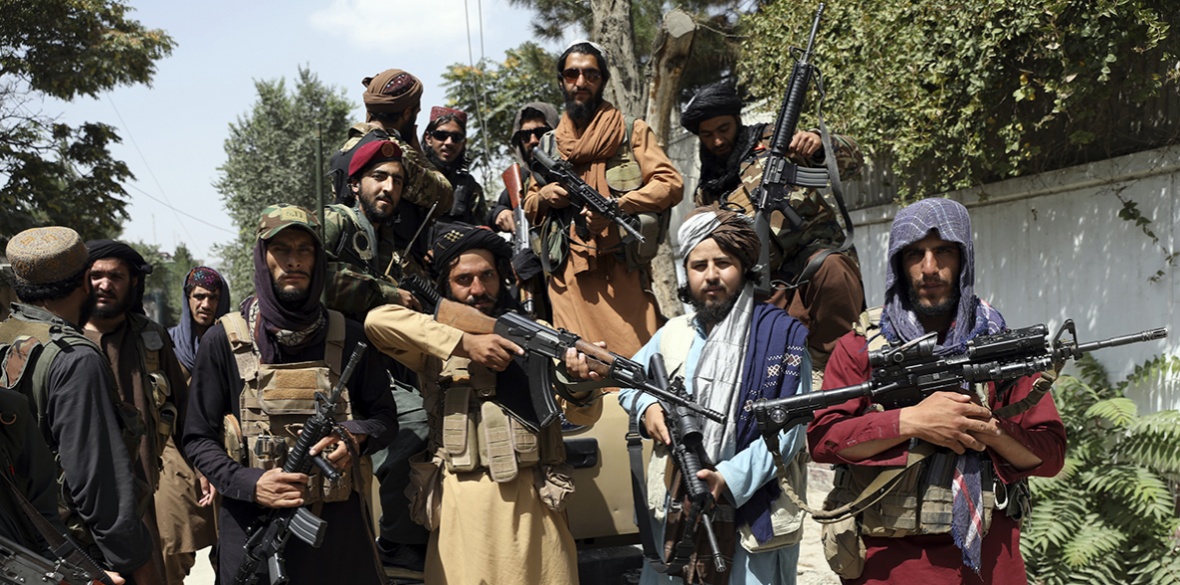This is the last article you can read this month
You can read more article this month
You can read more articles this month
Sorry your limit is up for this month
Reset on:
Please help support the Morning Star by subscribing here
TALIBAN fighters tortured and killed members of an ethnic minority group in Afghanistan after overrunning their village last month, campaigners reported today — fuelling fears of further atrocities now it has national power.
The report by human rights organisation Amnesty International, which branded the incident a “brutal massacre,” came as further calls were made for safe asylum routes to be opened for those seeking to escape Afghanistan.
Researchers spoke to eyewitnesses in Ghazni province who said that the Taliban killed nine ethnic Hazara men in the village of Mundarakht in early July.
They found that six were shot, some in the head, while three were tortured to death. One was said to have been strangled with his own scarf and to have had his arm muscles sliced off.
Villagers said they escaped to the mountains when fighting intensified between government forces and Taliban fighters.
They said that when some of them returned to collect food, the Taliban had looted their homes and were waiting for them to return.
Some men who passed through Mundarakht on their way home were also ambushed.
Hazaras, who are mostly Shi’ite Muslims and make up Afghanistan’s third-largest ethnic group, have previously been persecuted under Taliban rule.
Amnesty International secretary-general Agnes Callamard said the brutality of the killings was “a reminder of the Taliban’s past record and a horrifying indicator of what Taliban rule may bring.”
The group warned that many more killings may have gone unreported because the Taliban cut phone services in many areas.
The United Nations Refugee Agency warned that the humanitarian needs of people in Afghanistan must not be forgotten and urged states to preserve the right to asylum for Afghans arriving through both regular and spontaneous means.
Spokeswoman Shabia Mantoo said the agency “welcomes the efforts of several states to protect at-risk Afghan nationals through bilateral evacuation programmes.
“These bilateral evacuation programmes should not, however, overshadow or substitute for an urgent and wider international humanitarian response.
“Nor should these hamper or preclude the possibility for Afghans to seek asylum in other countries.”
She raised concerns about the risk of human rights violations against civilians seeking refuge.
“As of today, those who may be in danger have no clear way out,” Ms Mantoo said.
“UNHCR is calling on countries neighbouring Afghanistan to keep their borders open in light of the evolving crisis in Afghanistan.”
In Britain, a row continued over a luxury holiday taken by Foreign Secretary Dominic Raab as the Taliban advanced.
Having faced calls to resign after failing to make a vital phone call to his Afghan counterpart during that time, he said in a statement that the call, which was delegated to a junior minister, was not made only because the Afghan official “was unable to because of the rapidly deteriorating situation.”
But Labour demanded further details about the government’s response and Mr Raab’s holiday at a Crete hotel while Kabul fell to the Taliban.
Shadow foreign secretary Lisa Nandy said Mr Raab’s statement did not add up.
Chaotic scenes continued to unfold at Kabul international airport as thousands of people continued to try and flee the country.
Others have taken to the streets to protest the takeover and Taliban fighters have violently tried to suppress acts of defiance.
Under the Taliban’s previous rule, women were largely confined to their homes, television and music were banned and public executions were regularly held.
NGO Reporters Without Borders expressed alarm after news that Taliban fighters killed the family member of an Afghan journalist working for Germany’s Deutsche Welle on Wednesday, warning that the brutal action shows that the lives of independent media workers are in danger.
The broadcaster said that fighters conducted house-to-house searches for their reporter, who had already relocated to Germany.
It said the Taliban had also raided the homes of at least three of its journalists.
The Taliban are also rounding up a blacklist of people they believe worked in key roles with the previous administration or with US-led forces, according to a Norway-based private intelligence group.
RHIPTO Norwegian Centre for Global Analyses executive director Christian Nellemann said the organisation knew about several threat letters sent to Afghans, including a man who was taken from his Kabul apartment this week by the Taliban.
European countries have pledged to evacuate people at special risk from the Taliban, such as feminists, political activists and journalists, but the details of such promises are unclear and France and Germany have also pushed for refugees to be “contained” in transit countries and kept out of the EU.
The US said it would pick up the pace of evacuations for Americans and their allies following criticism that it was going too slowly.
Spain’s Defence Minister Margarita Robles said that Spanish military transport planes were leaving Kabul partly empty in the tumult.
“Nobody’s in control of the situation,” Ms Robles told Spanish public radio service RNE.
Taliban leaders are meeting with some officials from previous Afghan administrations to discuss their new regime.
An Afghan official familiar with the talks indicated that nothing would come of them before the last US troops leave, which is currently planned for August 31.
Lead Taliban negotiator Anas Haqqani said the group agreed with the US to “do nothing” until after that date, according to the official, who spoke on condition of anonymity because he was not authorised to give information to the media.









